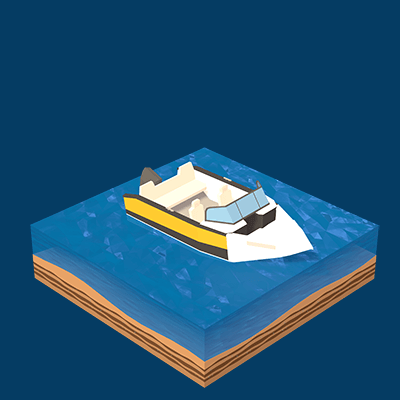

The masthead light is a white light projecting towards the front of the boat.
Sorry, wrong answer.
The masthead light is a white light projecting towards the front of the boat.
Question 3 of 10What is affixed to a boat, attached to the transom on the starboard side above the waterline, to prove that it was built in accordance with the construction requirements?
Right or Wrong?The HIN (Hull Identification Number)
The certificate of ownership
The capacity plate
Congratulations, good answer!
The Hull Identification Number (HIN) is the boat’s serial number. Boats built after 1972 must have a Hull Identification Number (HIN) permanently attached to the transom on the starboard side above the waterline.
Sorry, wrong answer.
The Hull Identification Number (HIN) is the boat’s serial number. Boats built after 1972 must have a Hull Identification Number (HIN) permanently attached to the transom on the starboard side above the waterline.
Question 4 of 10Which is the proper route that the boat must take?
Right or Wrong?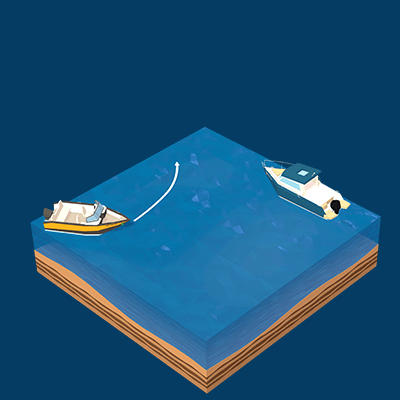
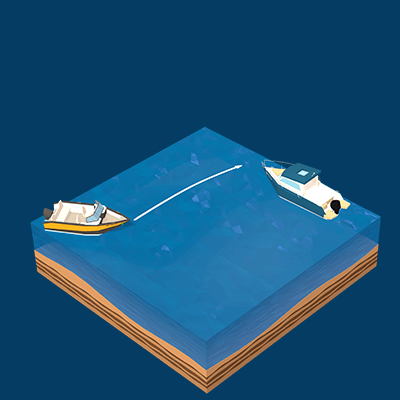
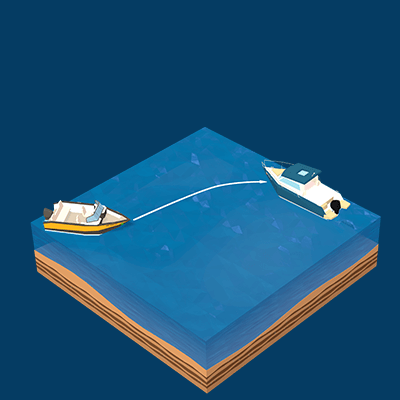
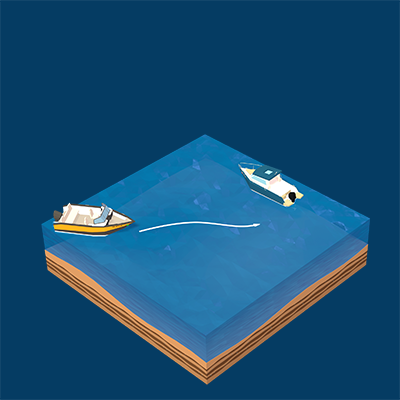
Congratulations, good answer!
As a give-way vessel, the boat is directed to keep out of the way of the other boat, which is a stand-on vessel, by taking early and substantial action to keep well clear.
Sorry, wrong answer.
As a give-way vessel, the boat is directed to keep out of the way of the other boat, which is a stand-on vessel, by taking early and substantial action to keep well clear.
Question 5 of 10Which illustration represents an information buoy among the following?
Right or Wrong?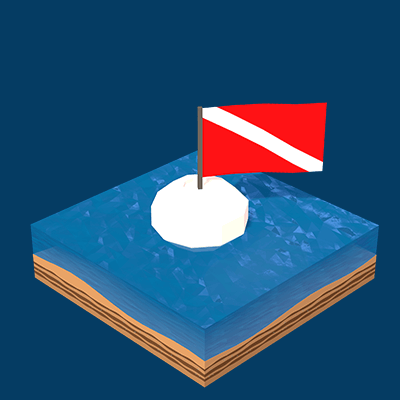
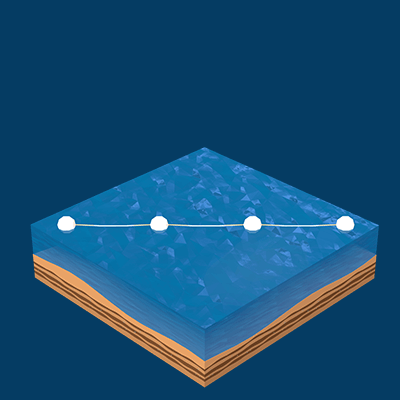
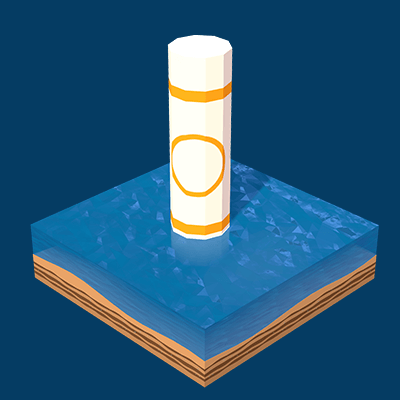
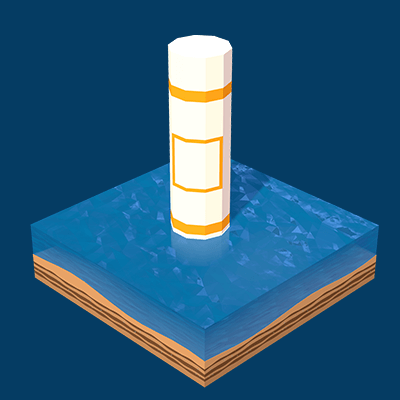
Congratulations, good answer!
The information buoy is the fourth one. It is white, with an orange, open-faced square symbol on two opposite sides and two orange horizontal bands, one above and one below the square symbols.
Sorry, wrong answer.
The information buoy is the fourth one. It is white, with an orange, open-faced square symbol on two opposite sides and two orange horizontal bands, one above and one below the square symbols.
Question 6 of 10Which illustration represents an exclusion buoy among the following?
Right or Wrong?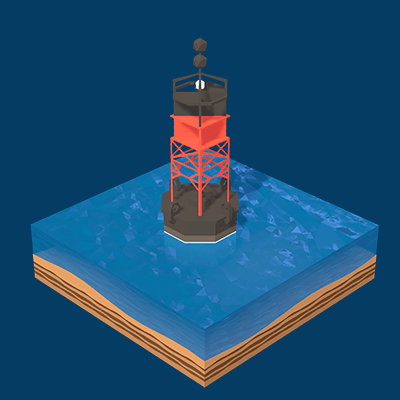
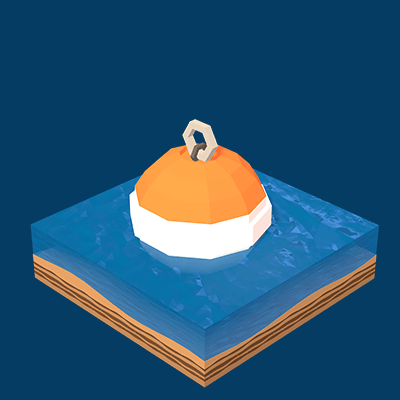
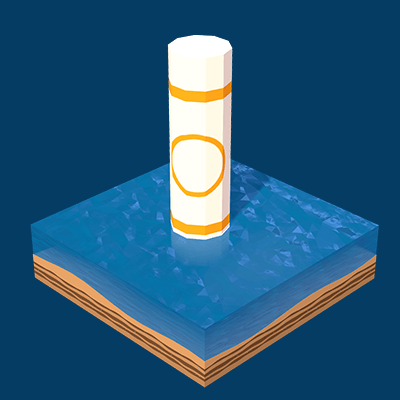
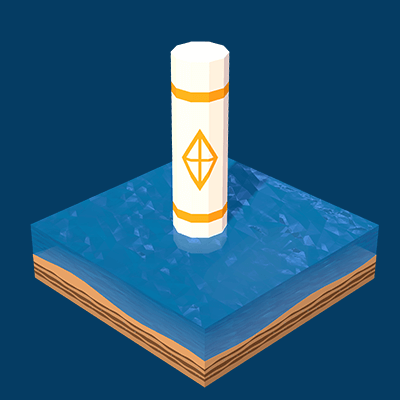
Congratulations, good answer!
The exclusion buoy is the fourth one. The explanation may be placed outside the crossed diamond shape, such as dam, rapids, swim area, etc.
Sorry, wrong answer.
The exclusion buoy is the fourth one. The explanation may be placed outside the crossed diamond shape, such as dam, rapids, swim area, etc.
Question 7 of 10A power-driven vessel shall keep out of the way of a sailing vessel.
Right or Wrong?Congratulations, good answer!
TRUE. As a stand-on vessel, the sailing vessel has the right of way on the power-driven vessel (give-way vessel). The sailing vessel shall maintain her course and speed.
Sorry, wrong answer.
TRUE. As a stand-on vessel, the sailing vessel has the right of way on the power-driven vessel (give-way vessel). The sailing vessel shall maintain her course and speed.
Question 8 of 10When a boat capsizes or is submerged, should you stay with the boat or try to reach the shore as quickly as possible?
Right or Wrong?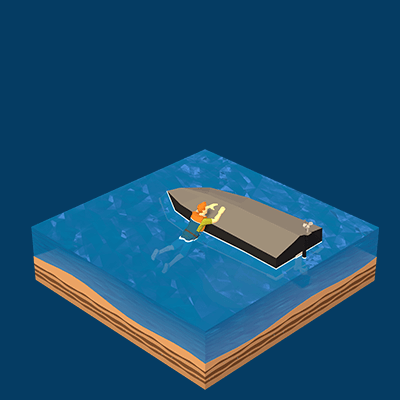
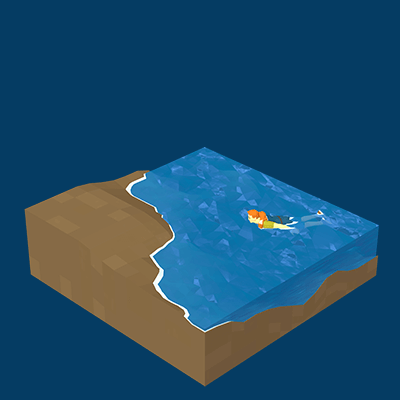
Congratulations, good answer!
If you should capsize, it may be safer to stay with the floating boat than try to swim to shore. Staying with the boat also provides an easier object for rescuers to see. Take a head count to make sure everyone is there, don life jackets, check for injuries and stay with the boat.
Sorry, wrong answer.
If you should capsize , it may be safer to stay with the floating boat than try to swim to shore. Staying with the boat also provides an easier object for rescuers to see. Take a head count to make sure everyone is there, don life jackets, check for injuries and stay with the boat.
Question 9 of 10Which picture represents the starboard side ?
Right or Wrong?
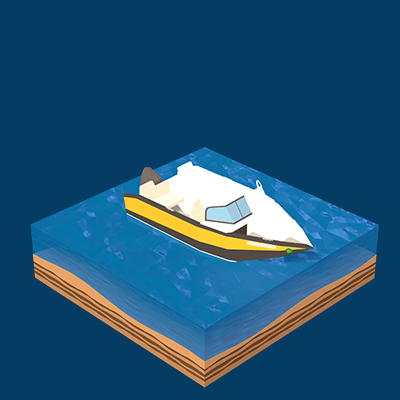
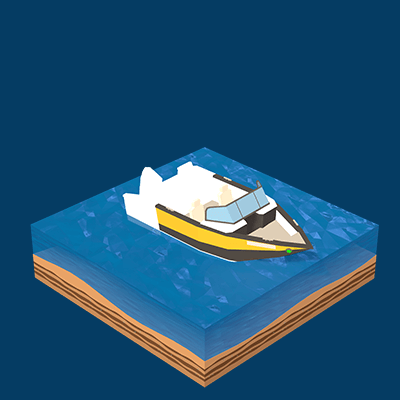
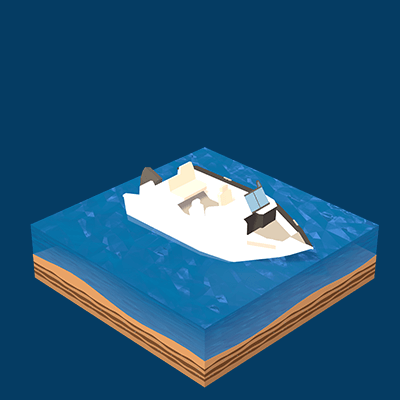
Congratulations, good answer!
The starboard side is the right side of a boat.
Sorry, wrong answer.
The starboard side is the right side of a boat.
Question 10 of 10To who should you leave a float plan before getting underway?
Right or Wrong?The local police
A responsible person
The sheriff's office
Congratulations, good answer!
Remember to communicate your float plan with a responsible person such as a family member or a friend. As well, during the trip, update your float plan in order to prevent unnecessary emergency operations.
Sorry, wrong answer.
Remember to communicate your float plan with a responsible person such as a family member or a friend. As well, during the trip, update your float plan in order to prevent unnecessary emergency operations.
There is no annual renewal fee!

Which picture is the graphical representation of a body of water that provides information on depths, traffic lanes and buoys.
Right or Wrong?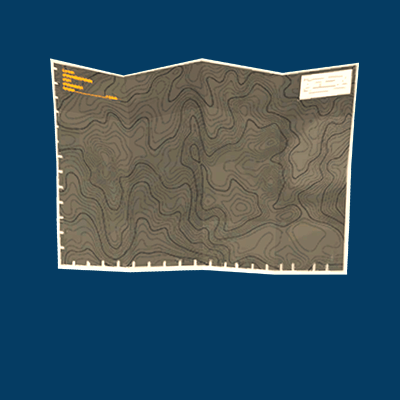

Congratulations, good answer!
Charts are graphic representations depicting areas of water, depicting the depths, underwater hazards, traffic routes, aids to navigation and adjacent coastal areas.
Sorry, wrong answer.
Charts are graphic representations depicting areas of water, depicting the depths, underwater hazards, traffic routes, aids to navigation and adjacent coastal areas.
Question 2 of 10You may use a PFD that is torn as long as it was well repaired by an approved manufacturer.

Congratulations, good answer!
FALSE. A PFD becomes void if it has been repaired or altered; therefore, it is no longer usable and must be replaced and discarded.
Sorry, wrong answer.
FALSE. A PFD becomes void if it has been repaired or altered; therefore, it is no longer usable and must be replaced and discarded.
Question 3 of 10Which of the four types of pyrotechnic devices must be used only in daylight?
Right or Wrong?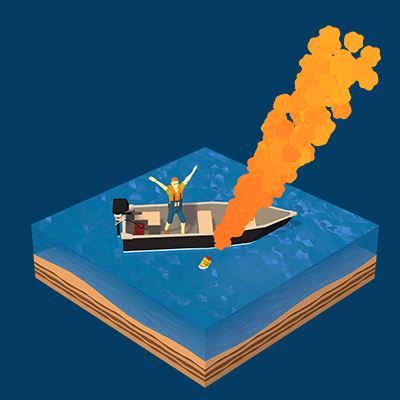
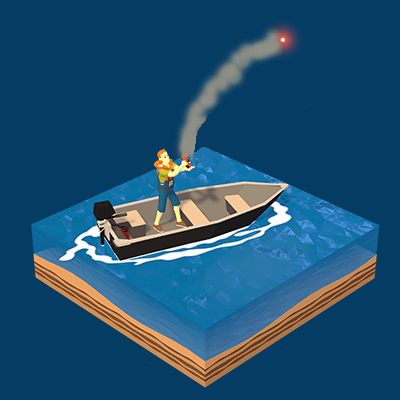
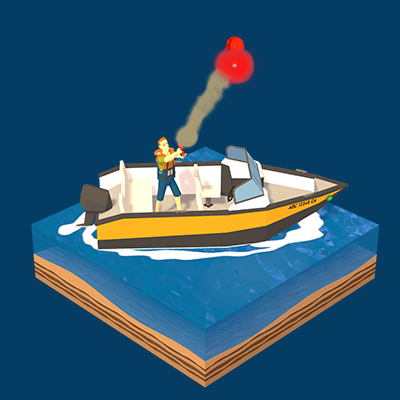
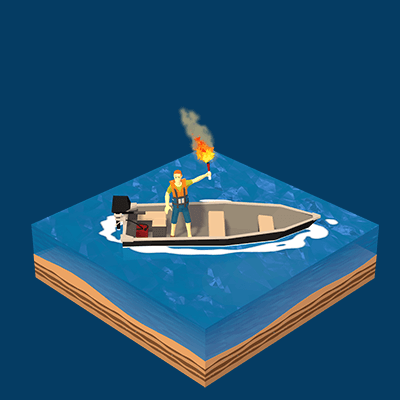
Congratulations, good answer!
The pyrotechnic orange smoke, hand-held or floating , may be used only in daylight.
Sorry, wrong answer.
The pyrotechnic orange smoke, hand-held or floating , may be used only in daylight.
Question 4 of 10 Right or Wrong?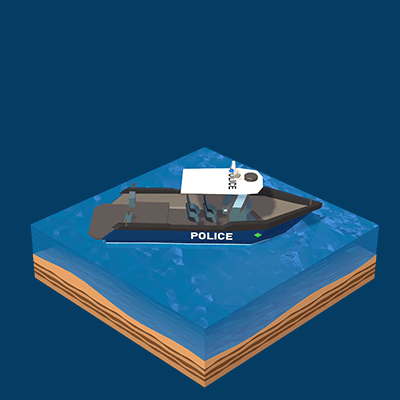
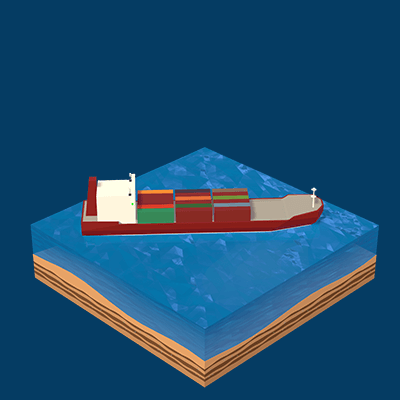
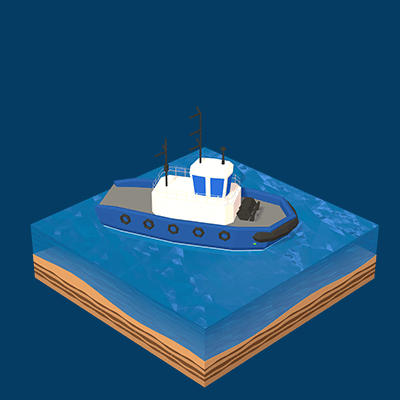
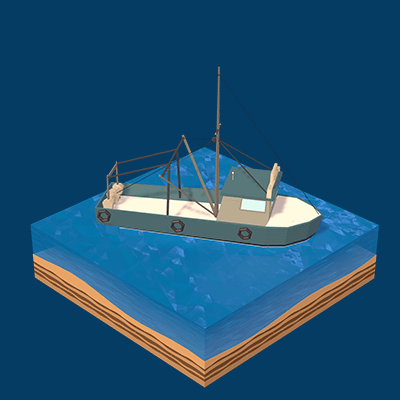
Congratulations, good answer!
If you see yellow lights or a flashing yellow light, stay away, it is a towing vessel with an object in tow.
Sorry, wrong answer.
If you see yellow lights or a flashing yellow light, stay away, it is a towing vessel with an object in tow.
Question 5 of 10What should we be prepared to show immediately to avoid a collision while navigating at night in a canoe or kayak?
Right or Wrong?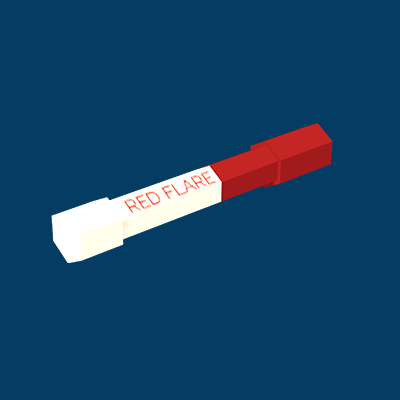
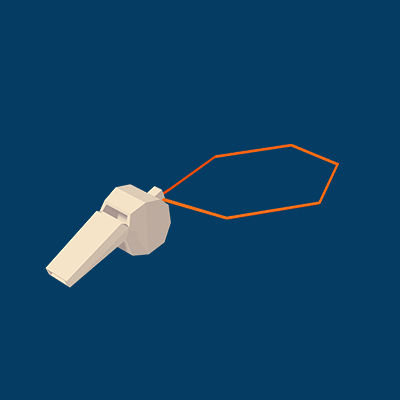
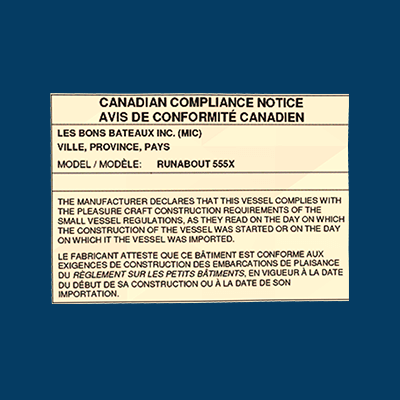
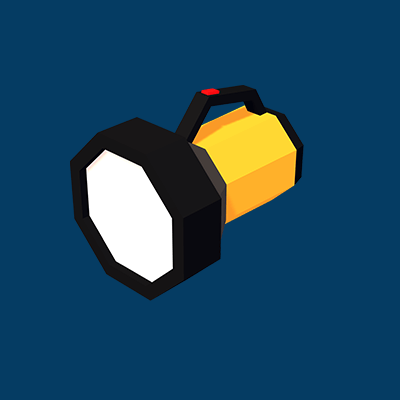
Congratulations, good answer!
A canoe or kayak may display the lights prescribed for sailing vessels, but if not, must have ready at hand an electric torch or lighted lantern (flashlight) showing a white light to be displayed in sufficient time to prevent collision.
Sorry, wrong answer.
A canoe or kayak may display the lights prescribed for sailing vessels, but if not, must have ready at hand an electric torch or lighted lantern (flashlight) showing a white light to be displayed in sufficient time to prevent collision.
Question 6 of 10What item is not displayed on a capacity plate?
Right or Wrong?The maximum carrying weight
The boat's top speed
The maximum persons capacity
The maximum horsepower recommended
Congratulations, good answer!
The capacity plate displays three important items: the maximum persons capacity, the maximum carrying weight - persons, motor & gear (pounds), and the maximum horsepower recommended for the boat.
Sorry, wrong answer.
The capacity plate displays three important items: the maximum persons capacity, the maximum carrying weight - persons, motor & gear (pounds), and the maximum horsepower recommended for the boat.
Question 7 of 10Which buoy marks an area where boating is restricted?
Right or Wrong?
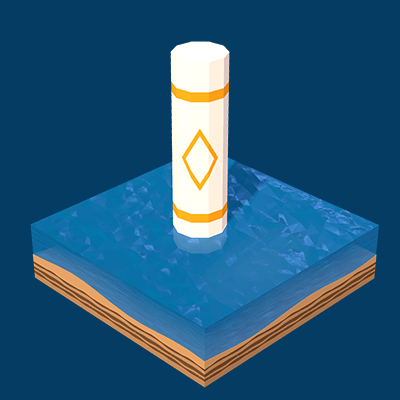


Congratulations, good answer!
The control buoy (the first illustration) fits this definition. Type of control is indicated in the circle, such as slow, no wake, anchoring, etc.
Sorry, wrong answer.
The control buoy (the first illustration) fits this definition. Type of control is indicated in the circle, such as slow, no wake, anchoring, etc.
Question 8 of 10What type of propulsion PWC are usually equipped with?

Congratulations, good answer!
Jet drives are usually inboard engines that take in water that flows through a pump powered by an impeller impeller. PWCs are usually equipped with a jet drive unit. These propulsion systems do not have propellers, which are a potential danger to people in the water and to marine life. The water is then discharged at high pressure through a nozzle, propelling the boat forward.
Sorry, wrong answer!
Most recreational boats in the United States use outboard engines and are less than twenty feet in length.
Question 9 of 10The following symptoms are related to which condition: slow pulse, confusion, drowsiness, lack of coordination?
Right or Wrong?Carbon monoxide poisoning
Congratulations, good answer!
These symptoms are related to hypothermia.
Sorry, wrong answer.
These symptoms are related to hypothermia.
Question 10 of 10Which image demonstrates the best practices to have when a diving operation takes place from aboard a pleasure craft?
Right or Wrong?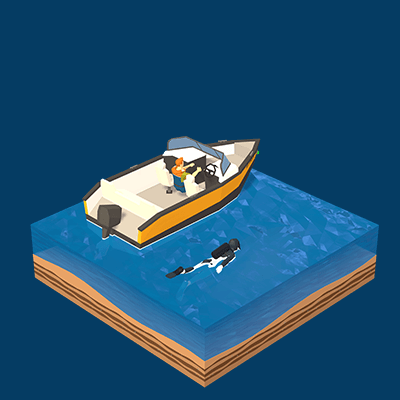
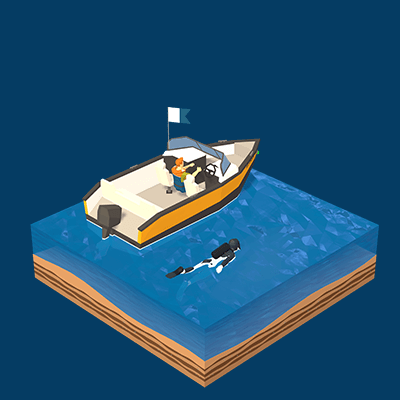
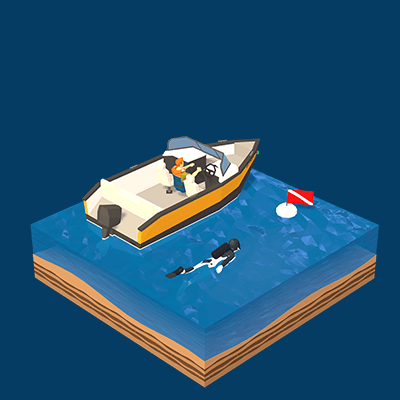
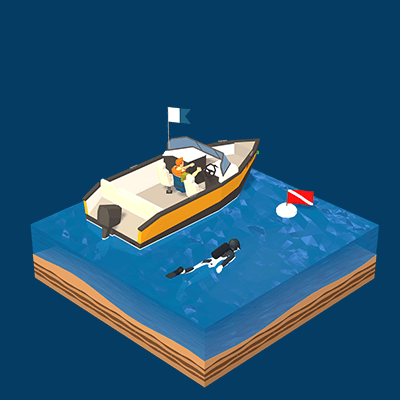
Congratulations, good answer!
The boat must display Flag A (blue and white). However, during diving operations you must install a diving flag in the water. It is Flag A, red and white. It marks an area where scuba or other such diving activity is taking place. It is white, and is mounted by a red flag with a white diagonal stripe, extending from the tip of the hoist to the bottom of the fly.
Sorry, wrong answer.
The boat must display Flag A (blue and white). However, during diving operations you must install a diving flag in the water. It is Flag A, red and white. It marks an area where scuba or other such diving activity is taking place. It is white, and is mounted by a red flag with a white diagonal stripe, extending from the tip of the hoist to the bottom of the fly.
The more you are, the less you pay! See our group pricing.

What is this buoy called?

Isolated danger buoy
Congratulations, good answer!
This buoy is a starboard hand buoy. It must be kept on the right side of the pleasure craft when heading upstream.
Sorry, wrong answer
This buoy is a starboard hand buoy. It must be kept on the right side of the pleasure craft when heading upstream.
Question 2 of 10Which type of anchor has less holding power and should only be used on small, lighter weight boats ?
Right or Wrong?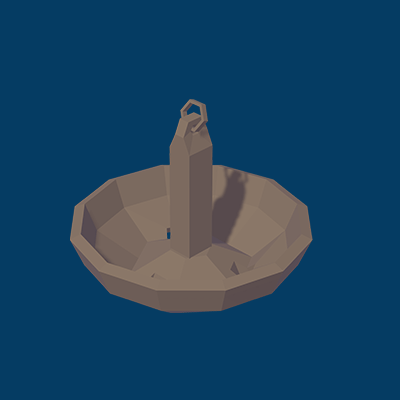
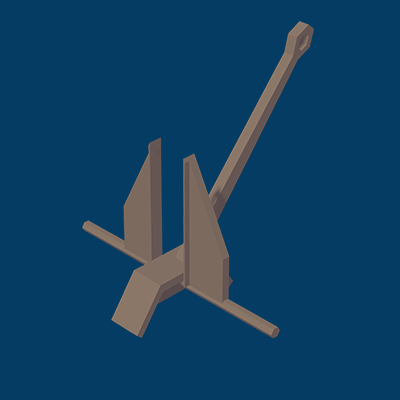
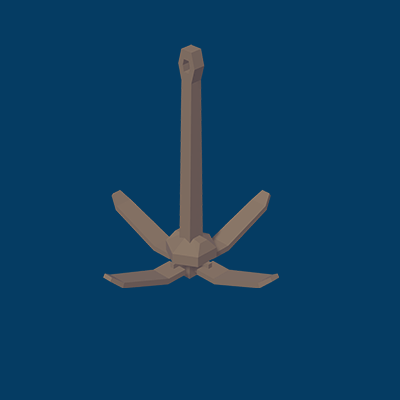
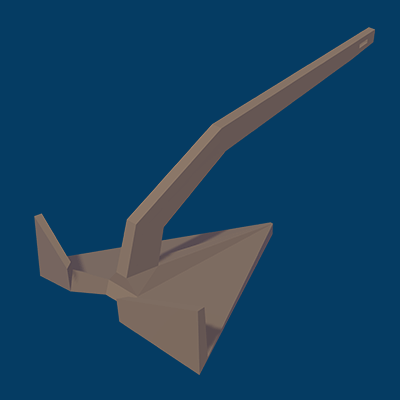
Congratulations, good answer!
The correct answer is the mushroom anchor. A mushroom anchors do not have the holding power of a fluke or plow anchor and should only be used on small, lighter weight boats. A local marine supply store can help you select the proper anchor for your boat and for the waters in which you will be boating.
Sorry, wrong answer.
The correct answer is the mushroom anchor . A mushroom anchors do not have the holding power of a fluke or plow anchor and should only be used on small, lighter weight boats. A local marine supply store can help you select the proper anchor for your boat and for the waters in which you will be boating.
Question 3 of 10Which factors must be taken into account in determining a safe speed?

Conditions of visibility and traffic density
The draft in relation to the available depth of water and the manoeuvrability of the vessel
Conditions of wind, sea and current, and the proximity of navigational hazards
All of the above
Congratulations, good answer!
All these answers are correct. Every vessel shall at all times proceed at a safe speed so that you can take proper and appropriate action to avoid collision, and be able to stop in a safe distance, and appropriate to the prevailing circumstances and conditions.
Sorry, wrong answer.
All these answers are correct. Every vessel shall at all times proceed at a safe speed so that you can take proper and appropriate action to avoid collision, and be able to stop in a safe distance, and appropriate to the prevailing circumstances and conditions.
Question 4 of 10What class of fire extinguisher will extinguish flammable liquids such as gasoline?

Congratulations, good answer!
The right answer is class B type fire extinguisher.
Sorry, wrong answer.
The right answer is class B type fire extinguisher.
Question 5 of 10What does this image represent?

An HIN (Hull Serial Number)
A proof of registration
A compliance notice
A validation decal
Congratulations, good answer!
The right answer is The HIN (Hull Serial Number).
Sorry, wrong answer.
The right answer is The HIN (Hull Serial Number).
Question 6 of 10For navigation lights requirements, sailing vessels less than 7 meters may carry an electric torch or lighted lantern showing a white light to be displayed in sufficient time to prevent collision.

Congratulations, good answer!
TRUE. Watertight flashlights may also qualify as navigation lights on kayak and canoe.
Sorry, wrong answer.
TRUE. Watertight flashlights may also qualify as navigation lights on kayak and canoe.
Question 7 of 10What are the markers in the following image called?

Safe water markers
Congratulations, good answer!
When entering from seaward you may find two channels which separate and go in different directions. A junction marker uses its top color to show you the primary channel. This is represented by a Red and Green buoy. You use the top color and shape as if it were a stand alone marker if you want to follow the primary channel.
Sorry, wrong answer.
When entering from seaward you may find two channels which separate and go in different directions. A junction marker uses its top color to show you the primary channel. This is represented by a Red and Green buoy. You use the top color and shape as if it were a stand alone marker if you want to follow the primary channel.
Question 8 of 10It is important to keep metal and/or electrical devices at a distance from the magnetic compass because it could display inaccurate information.

Congratulations, good answer!
TRUE. A magnetic compass will help the operator of a power-driven vessel to find directions.
Sorry, wrong answer.
TRUE. A magnetic compass will help the operator of a power-driven vessel to find directions.
Question 9 of 10Which of the following statements is incorrect regarding carbon monoxide (CO) poisoning?
Right or Wrong?Carbone monoxide can build up when two vessels are tied to each other.
Carbon monoxide poisoning occurs when you breathe too much carbon monoxide and it begins to replace the oxygen in your blood
It is important to run the engine at idle only in well ventilated areas in order to protect yourself and others from carbon monoxide poisoning
Symptoms of carbon monoxide poisoning are: hot, red and dry skin, rapid pulse, rapid and shallow breathing.
Congratulations, good answer!
The first three statements are true. But the symptoms of carbon monoxide poisoning are rather the followings: nausea, headache, mental confusion, dizziness or fainting, etc.. The symptoms can be mistaken for seasickness or the flu. If someone displays these symptoms, place them in fresh air immediately.
Sorry, wrong answer.
The first three statements are true. But the symptoms of carbon monoxide poisoning are rather the followings: nausea, headache, mental confusion, dizziness or fainting, etc.. The symptoms can be mistaken for seasickness or the flu. If someone displays these symptoms, place them in fresh air immediately.
Question 10 of 10What is the main purpose of a bucket on a pleasure craft?

Extinguish fires from combustible liquids such as gasoline, oil and grease
Extinguish fires from electrical equipment
To put the fish in
Extinguish A type fires
Congratulations, good answer!
The main purpose of the bucket is to extinguish type A fires which are combustible solids (wood, textile, paper, etc.).
Sorry, wrong answer.
The main purpose of the bucket is to extinguish type A fires which are combustible solids (wood, textile, paper, etc.).
See without any obligation how great our course is!

Which of the following does not represent a distress signal?
Right or Wrong?
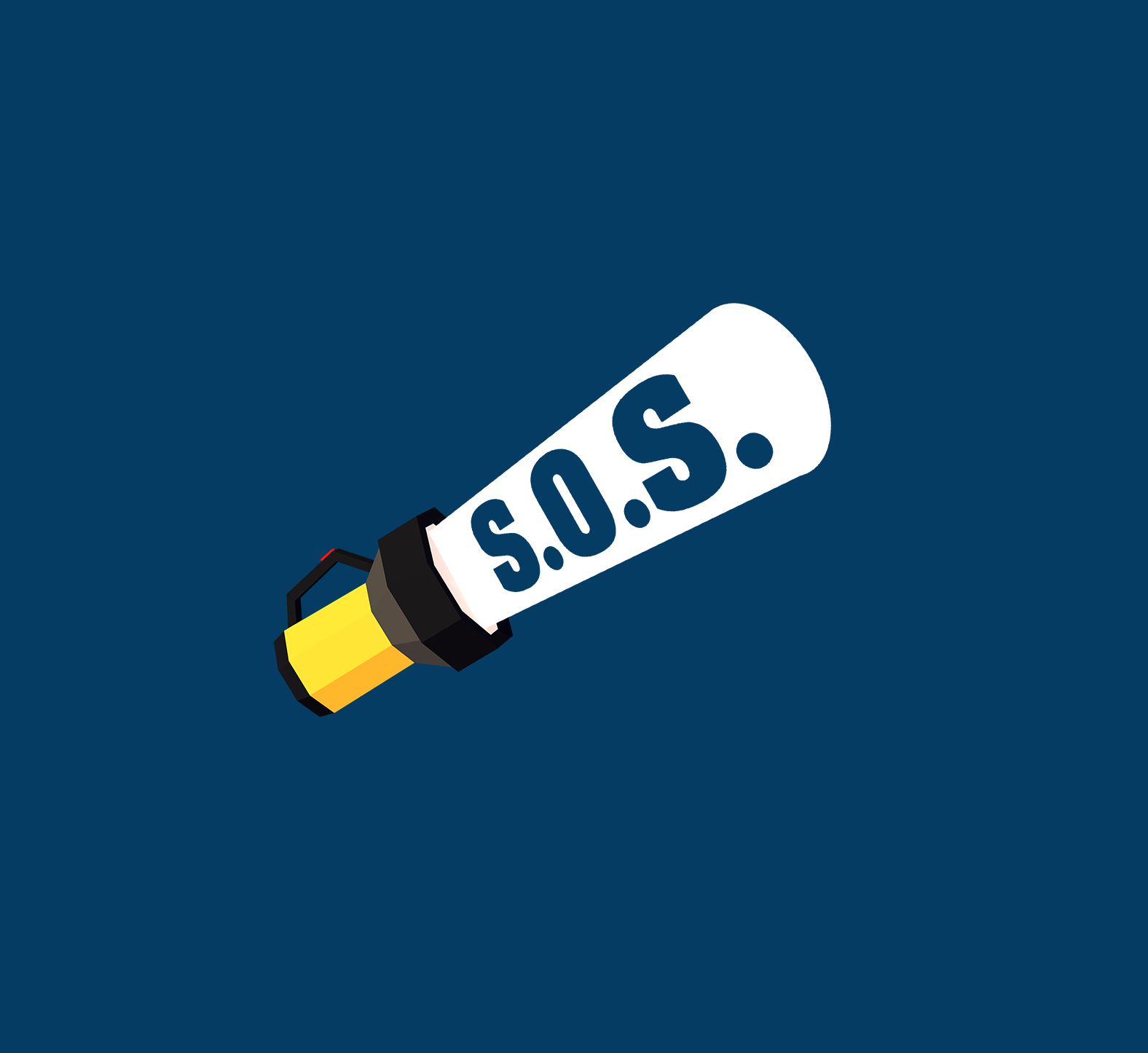


Congratulations, good answer!
The third image is not a distress signal. It is a diving buoy that marks an area where scuba or other such diving activity is taking place.
Sorry, wrong answer.
The third image is not a distress signal. It is a diving buoy that marks an area where scuba or other such diving activity is taking place.
Question 2 of 10Regulations on speed limits on water are the same wherever you are in United States.

Congratulations, good answer!
FALSE. Most specific speed regulations are local ordinances or state laws. Many states have speed and distance regulations that determine how close you can operate to other vessels, the shoreline or docking area, and swimming areas. For example, some state regulations require that you maintain a no-wake speed when within 250 feet of shore or when within 100 feet of another vessel. Be sure to check with state and local authorities to determine what regulations apply to you.
Sorry, wrong answer.
FALSE. Most specific speed regulations are local ordinances or state laws. Many states have speed and distance regulations that determine how close you can operate to other vessels, the shoreline or docking area, and swimming areas. For example, some state regulations require that you maintain a no-wake speed when within 250 feet of shore or when within 100 feet of another vessel. Be sure to check with state and local authorities to determine what regulations apply to you.
Question 3 of 10Which statement is incorrect regarding the registration number?
Right or Wrong?The registration number must be display on the back of your vessel.
It is a combination of letters and numbers normally beginning with the abbreviation of the State in which the boat is registered.
It must be painted or apply as a decal with block style letters and numbers of at least 3 inches in height.
The color used for the letters and numbers must contrast with the hull.
Congratulations, good answer!
The registration number is actually a combination of letters and numbers normally beginning with the abbreviation of the State in which the boat is registered. You must display your registration number on the forward part of your vessel well above the waterline. You must paint the numbers or apply them as a decal, where law enforcement officials can easily read them. Use BLOCK style letters and numbers of at least 3 inches in height. The color must contrast with the hull.
Sorry, wrong answer.
The registration number is actually a combination of letters and numbers normally beginning with the abbreviation of the State in which the boat is registered. You must display your registration number on the forward part of your vessel well above the waterline. You must paint the numbers or apply them as a decal, where law enforcement officials can easily read them. Use BLOCK style letters and numbers of at least 3 inches in height. The color must contrast with the hull.
Question 4 of 10As a general rule, recreational boaters should put out 7 to 10 times the depth of the water plus the distance from the water to where the anchor will attach to the bow.